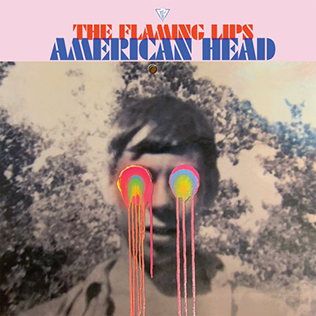The Flaming Lips is a pretty tough nut to crack. They release a lot of records, and take a lot of risks; and thusly their albums can be pretty hit-or-miss. For the last decade plus, the troupe of Oklahoma weirdos have leaned heavily on the psych portion of their neo-psychpop brand. Following their landmark 2009 release Embryonic, The Flaming Lips have released increasingly eccentric originals and bizarre collabs (usually famous pop musicians who are unconventional enough to produce lysergic oddities, but mainstream enough for it to still be kitschy), with results ranging from incredible, to indulgent garbage . Either way, Wayne Coyne and his band of merrymakers certainly have a knack for hiding catchy earworms within some really out-there shit. But, here we are in 2020, and The Lips have bookended their sonic evolution by drifting back towards the melody with their new album, American Head.
American Head is The Flaming Lips most accessible record since 2006's At War with the Mystics and the denouement of the "Yoshimi Era." Whereas much of the last decade has focused on pushing the envelope, American Head centers itself back on song. A fine return to form for The Lips, as Coyne captures the trippy sing-a-long aesthetic of The Soft Bulletin and Yoshimi Battles The Pink Robots. There are plenty of hooks for fans to sink their teeth into. Some could argue that American Head lacks the brazen experimentation that Lips fans look for, which is a valid assessment, but there is still enough ambition and exploration to hold interest.
The Flaming Lips are no strangers to concept albums, and this new record is no exception. However, American Head is far more thematically grounded than some of their other high level concepts (I won't even try to explain King's Mouth). American Head is, oddly enough, loosely inspired by Tom Petty's early band, Mudcrutch, and what would have happened if they (or any band, really) would have stuck around Oklahoma after a gig and never made it big. The record deals with the fairly pedestrian ideas of drugs, hometown, isolation, and death; very relatable for the bands Gen-X and subsequent fanbase. For literary fans, it is very reminiscent of Stephen Markley's phenomenal work, Ohio, who's story grapples around reconciling the warts-and-all facets of "home." There are many autobiographical pulls in American Head, such as Coyne's days as a young pot dealer in "You n Me Selling Weed," and a fast food restaurant getting robbed at gunpoint in "Mother Please Don't Be Sad." While the songs are veiled and abstract, it extends a rapport not often found in Flaming Lips songs.
Sonically, American Head is beautiful. It contains all the primary tenets and subtleties that the Psych world loves about The Flaming Lips, but with more pathos than almost any other album in their catalog. A gorgeous melancholy runs through American Head that creates a stunning landscape, full of gracefully rolling instrumental hills fed through fuzzy psych. The album's final two tracks, "God And The Policeman" (featuring country crossover star and unlikely psychonaut Kacey Musgraves) and "My Religion Is You" are aurally captivating capstones; a fantastic way to conclude this psychedelic pastoral.
It's pretty wild that The Flaming Lips have been around almost forty years. They have covered a lot of ground in that time; literally and figuratively traveling further than most other bands in mainstream music. It's likely no coincidence that American Head feels like a homecoming, as this seems to be The Flaming Lips "return" to earth (albeit still a very mind-bending one). The Lips have come down from their trip, and are comfortably resting in what they know best...much like the characters in American Head.
Album Grade: The best Flaming Lips record in many years!


